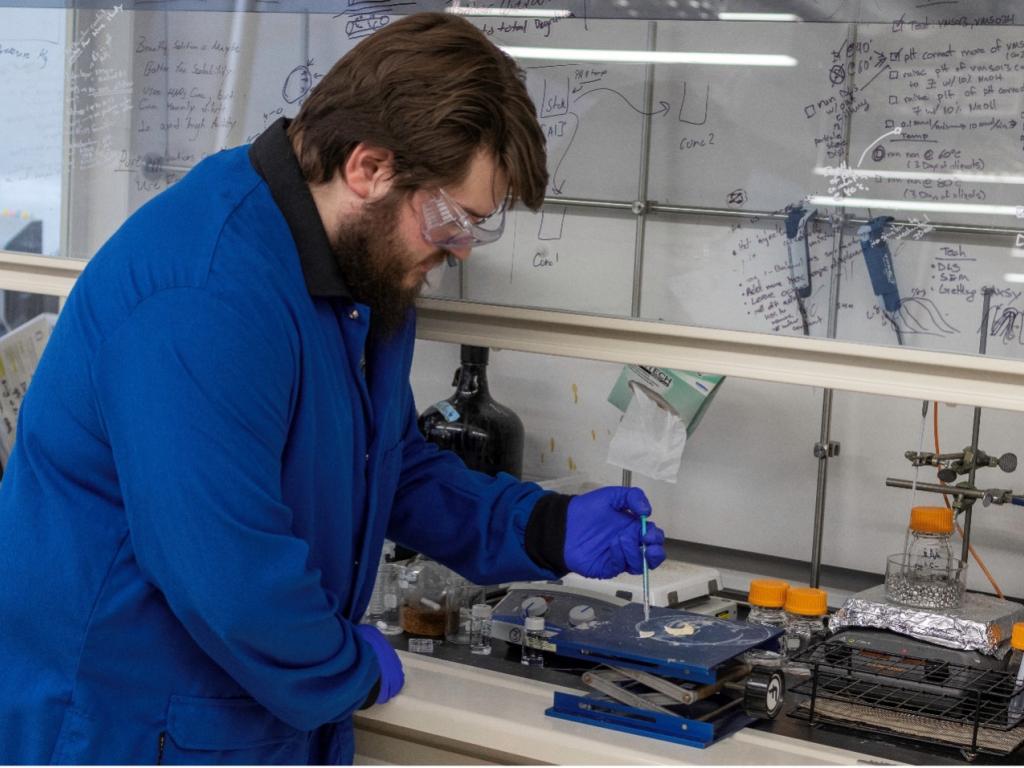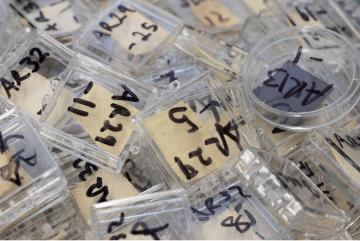
Editor's note: This article was produced by a student participating in the course J477/577: Strategic Science Communication, a collaboration between the School of Journalism and Communication’s Science Communication Minor program and the Research Communications unit in the Office of the Vice President for Research and Innovation.
As he sorted through drawers of samples, it was clear that Alex Rosen was dedicated to his work. Hundreds of small squares of cotton, fabric, and paper sat around his workspace. Meticulously categorized in his lab notebook, each scrap represents a slight step towards a sustainable world, one free from forever chemicals.

Rosen, a fourth-year PhD candidate in the Department of Chemistry and Biochemistry, studies the use of mineral oxide coatings to waterproof textiles and paper products. In collaboration with his lab mentor Darren Johnson, professor of chemistry and director of the Materials Science Institute, he is spinning off his research into a start-up that will provide a sustainable alternative to perfluoroalkyl and polyfluoroalkyl substances (PFAS), a family of ‘forever chemicals’ that pose significant danger to human and environmental health. Rosen has recently secured grant funding from the Oregon Innovation Challenge, a program organized by the University of Oregon Lundquist Center for Entrepreneurship.
“We take what is effectively dirt, it’s an aluminum-based compound, in water and we spray that onto the material we are looking to treat,” said Rosen. “We treat that with high-powered light, and that creates a beautiful, clear film on the surface we’re looking at. That film has all the properties we’re looking for, making the surface waterproof, making it resistant to stains or oils, making it resistant to fire.”
Dirt isn’t an exaggeration, either. Aluminum is the most abundant element in the earth’s crust.
Rosen’s work started under Dr. Jordan Levine, a former member of Johnson’s lab who now works for Nike. After Levine’s graduation, Rosen continued to refine the application process of the mineral films, until it was as streamlined as possible. But combatting PFAS takes more than some cool chemistry. This harmful group of chemicals is a frustrating combination of both effective and inexpensive, meaning any safe and sustainable alternatives must be as, if not more, affordable and effective before industry leaders will be convinced to switch over despite the damage PFAS inflicts on the environment and human health.
“The issue with PFAS stems from the fact that they work so darn well at what they do,” Rosen said.
Rosen is confident that aluminum oxide coatings have the potential to be that alternative.
“I genuinely think this has the potential to be that replacement that’s inexpensive, harmless to the environment, has no impact on human or environmental health, [while] also performing well,” Rosen said.
The Science of Entrepreneurship
Rosen’s path to entrepreneurship didn’t start with the Oregon Innovation Challenge. In preparation to launch his startup company, Rosen participated in the Lens of the Market program offered by the Materials Science Institute. The program helps scientists translate their research into commercial pursuits by helping them identify the multitude of ways a technology can be used and which application they should first pursue.
He is also seeking funding from the University of Oregon’s Office of the Vice President for Research and Innovation’s Translational Opportunity Fund to cover the rest of his studies. This helps to cover the transition period Rosen will face as he goes from student to business owner. In addition to internal funding from the UO, he is also seeking seed funding from the National Science Foundation SBIR and STTR programs.
Developing a company out of a university research lab can be a complicated process. Rosen mentioned the benefit of Launch Oregon, a University of Oregon Foundation-affiliated company that helps researchers spin out businesses from their intellectual property.
“They’re super helpful in finding resources,” Rosen said. They provide connections to attorneys, banks, HR management, and other roles in the company that can’t be covered by Rosen or Johnson, who also helped launch Supra Sensor Technologies.
Rosen will serve as the science lead of the company but, as with most startups, Rosen has accepted that in the early months, he’ll need to fill every role from CEO to janitor. Because of Johnson’s experience in launching scientific start-ups, he will work with Rosen as cofounder and a member of the Board of Directors. Rosen expects to graduate either this fall or next spring, intending to jump immediately into the startup.
Charting a PFAS-free future
With a growing hyper-focus on convenient and efficient packaging, developers are desperately in need of sustainable replacements for PFAS, which have been building up in soil, water sources, and organisms like fish for decades. Some of these ‘forever chemicals’ may cause developmental delays in children, increase the risk of prostate and kidney cancers, increase cholesterol levels, and decrease fertility, as well as weaken immune systems.
Prevalent in waterproof textiles, firefighting foam, non-stick cookware like Teflon, food packaging, upholstery, and cosmetics, these compounds have found their way into multiple avenues of everyday life.
“If you’ve ever been drinking with a paper straw and it’s started to dissolve into your drink,” Rosen said, “then it likely had a PFAS coating on it. The PFAS have leached out into your drink and the straw is just bare paper now.”
As we grapple with the toxic effects of forever chemicals, funding startups like Rosen’s provides a path toward a brighter, PFAS-free future.
